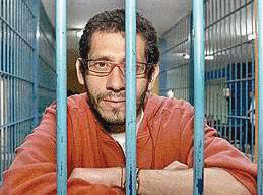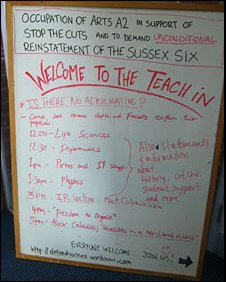Mario Novelli, University of Sussex, m.novelli@sussex.ac.uk
November 29th, 2010


The new UK government has made public its plans for Higher Education. Teaching budgets are to be slashed, social sciences and humanities undermined, and student fees set to rise from around £3000 to up to £9000 per year. The full privatisation of higher education beckons. The proposals will lead students into massive debts, are likely to deter working class students from attending university, further polarise the University sector, and undermine social sciences and humanities – ‘soft subjects’ not seen as economically productive.
It seems that for the UK government the financial crisis represents what Naomi Klein in her book ‘The Shock Doctrine’ sees as a mechanism to justify the remaking of society in ways that privilege vested wealth and power. Crisis – be that economic, natural disaster or war – becomes an opportunity to do things that in times of normality seem impossible. This insight has led me to reflect on my visit to Colombia in December 2009. There the crisis was less economic than miltary. A civil war ‘crises’ that was justifying reform, but its focus at that time was similarly the public university. Any resistance to neoliberalism inside the public universities in Colombia was seen as evidence of ‘guerrilla’ intervention on campus. Many academics and students were afraid of speaking out because of this stigmatisation, but thankfully many were not. One such dissident voice was Miguel Angel Beltran, a Colombian academic who has refused to remain silent in the face of repression. His story is I hope both depressing, instructive and inspiring.
On 22nd of May, 2009, Miguel Angel Beltran, whilst on sabbatical in Mexico, went to renew his visa at the Mexican immigration authorities. He’d been in Mexico for several months studying at the UNAM (Universidad Nacional Autonoma De Mexico). Upon entering, he was arrested and deported to Colombia by plane, contravening his right both to due process and Mexico’s extradition treaty with Colombia. Upon arrival he was charged with ‘rebellion’ and ‘conspiracy to commit terrorist acts’ and remains in prison awaiting trial.
The Colombian government alleges that his alias is “Jaime Cienfuegos”, a FARC ideologue and terrorist. They argue that they discovered documents relating to Jaime Cienfuegos in a laptop recovered in Ecuador at the site where the military bombed and killed Raul Reyes, a prominent leader of the FARC, on March 21st 2008. Miguel denies these allegations arguing that he is the victim of a government seeking to silence all critics.
Miguel is a sociologist at the National University of Colombia, and an outspoken critic of both the neoliberal reforms being pushed through in public universities and the Uribe government. In a letter from prison in August 2009 he reflected on the way sociologists became targeted in Colombia stating that while the sociology of the 1950s in Colombia was aligned with the state, it later became more critical and committed to social change, leading the “discipline to be seen by certain social and political sectors as a threat”. Since then “the stigma of ‘subversive’ weighs heavily on sociologists” and “the list of sociologists persecuted and harassed for their thoughts is long”. Miguel noted in a further prison letter that “although these bars and armed guards try to scare me and to debilitate my democratic convictions, I guarantee that I will maintain unbroken my critical voice, my commitment to the defence of the public university and the search for political solutions to the armed and social conflict in Colombia”.
In November, the University College Union, the UK’s higher education trade union, sent a petition signed by over 1000 academics to the Colombian government calling for Miguel’s release. Though only a letter of support, the response of so many academics is impressive. Partly this can be explained by the fact that people admire what Miguel stands for: the academic as critic, as a voice of opposition and dissent. Sadly this is a characteristic disappearing in the UK as we have became caught up in academic capitalism, grants chasing and competing against our colleagues. However, precisely at that meeting point between Miguel’s situation and the example he sets us, is where the real potential of solidarity begins – reciprocity. Miguel serves as inspiration for the University community to challenge the government’s plans for our institutions, to reclaim the University once again as the conscience of society, and to use the current crisis to remake our institutions and our societies in the interests of the many, rather than the few.
Links:
http://libertadmiguelangelbeltran.blogspot.com/
https://www.ucu.org.uk/index.cfm?articleid=4742
http://todossomosmiguelangelbeltranvillegas.blogspot.com/2010/09/open-letter-dr-miguel-angel-beltran.html

